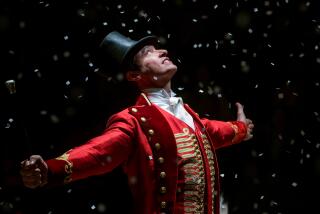POP WEEKEND : The King and the Princess Hold Court : Elvis, Elvis, Elvis in a Glitzy Vegas Rock Resurrection
- Share via
LAS VEGAS — Elvis Presley may be alive and well at the Burger King in Kalamazoo, Mich., but the next best thing is on the stage of the Las Vegas Hilton.
That, at least, is the idea behind “Elvis: An American Musical,” a multimedia theatrical revue based on the life, the times and mostly the music of the rock ‘n’ roll king.
While some tabloids and TV stations play up the dubious claim that Elvis is still alive and in hiding, the Hilton has trotted out three mock Elvises, surrounded them with lots of glitz and flash and put them on the same showroom stage where the real article played 16 separate engagements.
The result, which runs through Aug. 28, is a showy, silly, sketchy, but surprisingly entertaining look at the most powerful icon rock music has ever produced.
Certainly there ought to be more appropriate ways of honoring a man who smashed pop-culture barriers than by slavishly re-creating his every hip-swivel and lip-curl.
But when an Elvis substitute ripped into “Baby, Let’s Play House” or “Burning Love” during Friday’s opening performance, even a skeptic had to admit that this extravaganza can be a hoot--and at its best, it can pack a solid musical and even emotional kick as well.
Much of the credit should go to Johnny Seaton, who plays middle-period Elvis with off-hand authority, from the “Jailhouse Rock” sideways walk to the scarves-in-the-audience routine to the tough vocal tone. He can’t come close to the sublime authority or sheer exuberance of Elvis at his
best, but he’s as close as you’ll find in the curious world of Elvis substitutes.
Rightly, the show’s other Elvises have less time in the spotlight. Terry Mike Jeffrey plays young Elvis with appropriate innocence, but an anonymous rockabilly voice. And Julian Whitaker has the karate moves and the stockiness of late Elvis, but vocally, he falls short on some of the King’s most histrionic material.
But then “Elvis: An American Musical” shouldn’t be judged solely on the quality of its Elvises. Given the setting, the hype (“From the Choreographer of ‘Grease’ and the Director of ‘Beatlemania,’ ” say the ads) and the involvement of the Presley estate, it aims to be far more than another mock Elvis concert.
Mock Elvis concerts, after all, don’t usually include 14 singer-dancers, or video clips simultaneously projected on two rear screens and a front scrim, or 12-foot puppets watching “Elvis” perform inside a huge TV set, or any of the other special effects that bedeck, and sometimes clutter, the production.
But with “Elvis: An American Musical,” director-choreographer Patricia Birch and writer Robert Rabinowitz also try to tell a serious story. From the shy Southern misfit with the instinctive genius to focus and release the frustrations of a generation to the lonely man who couldn’t find any new dreams to fight for, Elvis’ story is as revealing and saddening as any in American popular culture.
To outline that story, film-clips put Elvis in historical context, narrative segments interrupt the song-and-dance, and each audio-visual production number has a deadly earnest title, such as “Last Throes of Innocence.”
But none of this really captures the scope of Elvis’ achievements. Not only does the production belabor its points, but it’s also hurt by its Nevada provincialism, painting Elvis’ 1969 return to Vegas as his comeback and ignoring his earlier, more revealing television special.
And when the Presley story turns darkest, the narrative essentially disappears--aside from a brief segment in which lines from some of Elvis’ speeches are reworked into a confused and angry Seaton monologue. The show’s failure of nerve is regrettable--to come to terms with Elvis, you have to face his tragedy--but it’s hardly unexpected from a musical staged in the town that served as the setting for much of Elvis’ own decline.
And ultimately, of course, “Elvis: An American Musical” is about the light, fun, big-grossing, moneymaking, crowd-pleasing side of Presley. It ends, appropriately and refreshingly, not with a ponderous, soul-searching ballad, but with the sheer, defiant zest of “Blue Suede Shoes.” The idea is to send ‘em home humming and grinning, and that’s what it did on Friday.
More to Read
The biggest entertainment stories
Get our big stories about Hollywood, film, television, music, arts, culture and more right in your inbox as soon as they publish.
You may occasionally receive promotional content from the Los Angeles Times.









